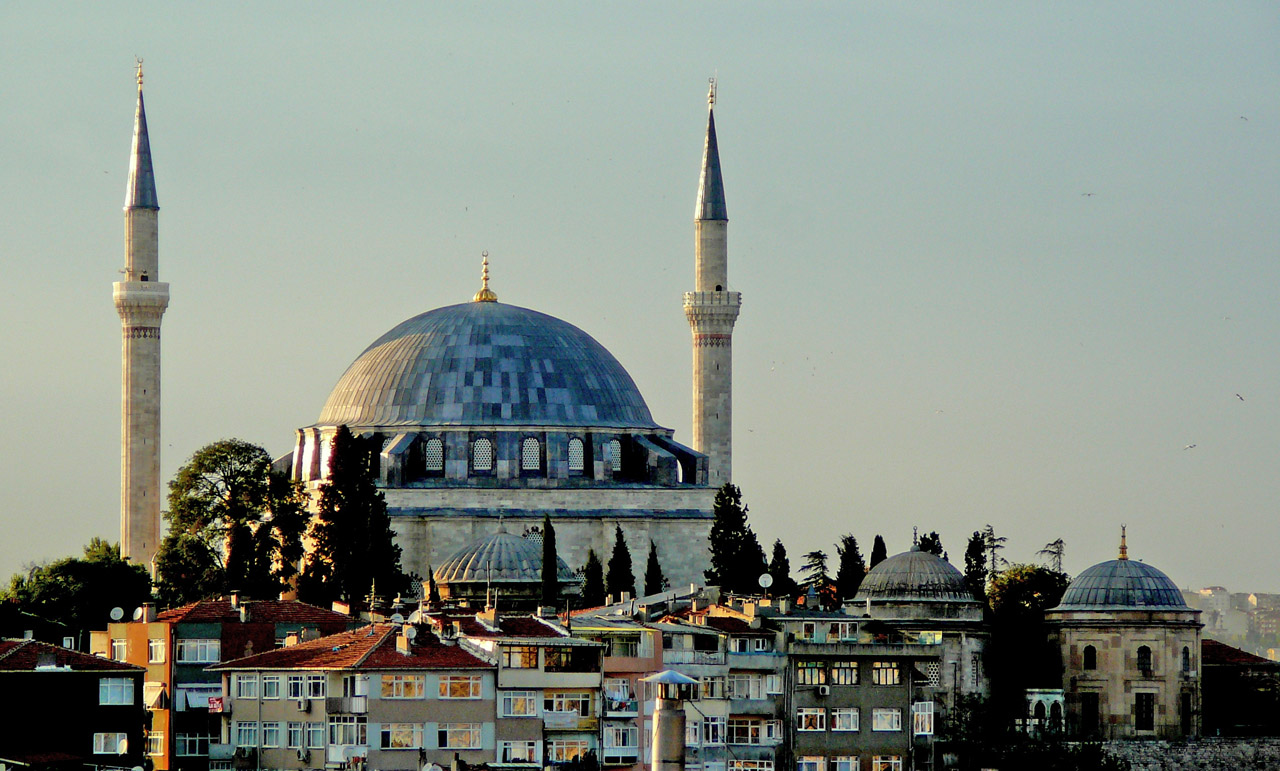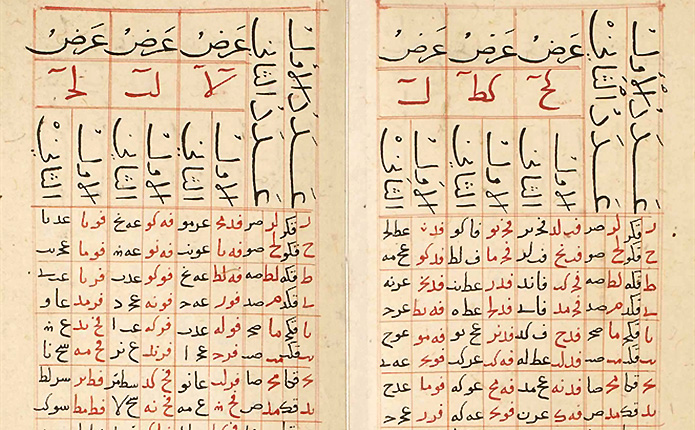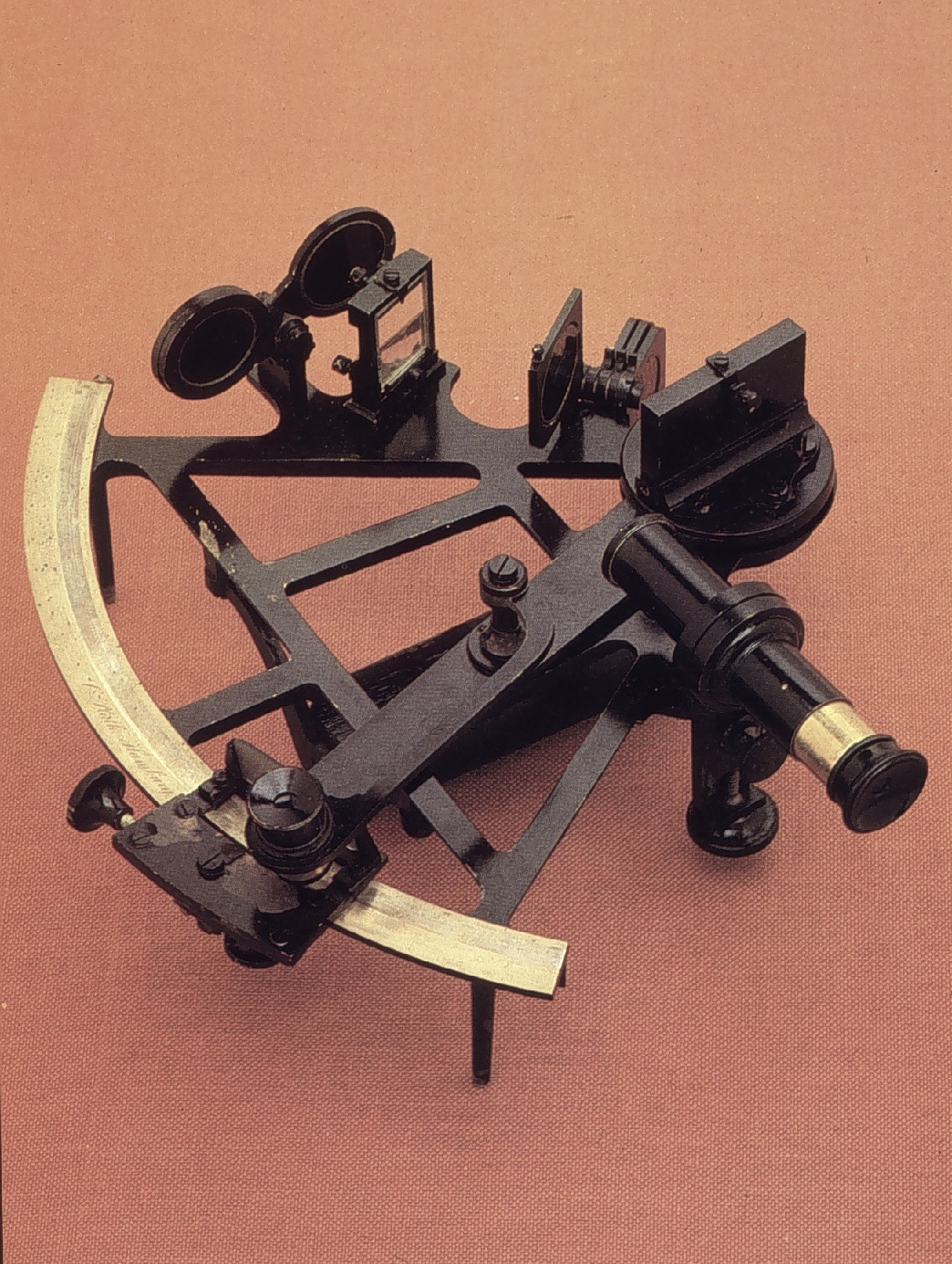|
Mustafa Ibn Ali Al-Muwaqqit
Mustafa ibn Ali al-Muwaqqit (died 1571, the epithet al-Muwaqqit means "the timekeeper"), also known as M√ľneccimbaŇüńĪ Mustafa √áelebi and Koca Saat√ßi, was an Ottoman astronomer and author of geography from the sixteenth century. Because of his works on the science of timekeeping and practical astronomy, he is considered "the founder of the Ottoman tradition" of those fields. He was one of the pioneers of astronomy literature in Ottoman Turkish‚ÄĒinstead of Arabic which was more common in the Islamic world‚ÄĒfollowing Muhammad al-Qunawi. Since his youth he served as the ''muwaqqit'' (religious timekeeper) attached to the Mosque of Selim I in Istanbul, in which capacity he produced most of his writing. In 1560 or later he was appointed to the office of ''m√ľneccimbaŇüńĪ'', the highest post for astronomers of the Empire. Early life Muslih al-Din Mustafa ibn Ali al-Qustantini al-Rumi was born in Istanbul, the capital of the Ottoman Empire, in the early sixteenth century. Among ... [...More Info...] [...Related Items...] OR: [Wikipedia] [Google] [Baidu] |
Muwaqqit
In the history of Islam, a ''muwaqqit'' ( ar, ŔÖŔŹŔąŔéŔāŔéŔĎō™, more rarely ''mńęqńĀtńę'') was an astronomer tasked with the timekeeping and the regulation of prayer times in an Islamic institution like a mosque or a madrasa. Unlike the muezzin (reciter of the call to prayer) who was usually selected for his piety and voice, a muwaqqit was selected for his knowledge and skill in astronomy. Not all mosques had a muwaqqit. The office was first recorded in the late 13th century in the Mosque of Amr ibn al-As in the Mamluk Sultanate of Cairo and then spread to various parts of the Muslim world. Even then, many major mosques only relied on muezzins to determine prayer times using traditional methods, such as observing shadow lengths and twilight phenomena. The lack of historical sources and research makes it difficult to ascertain the specific functions and roles of the muwaqqit. There is uncertainty among historians of science whether the muwaqqit was a specialised office whose ... [...More Info...] [...Related Items...] OR: [Wikipedia] [Google] [Baidu] |
Shams Al-Din Al-Khalili
Shams al-Dńęn AbŇę ŅAbd AllńĀh MuŠł•ammad ibn MuŠł•ammad al-Khalńęlńę ( ar, ōīŔÖō≥ ōßŔĄōĮŔäŔÜ ōĻō®ōĮ ōßŔĄŔĄŔá ŔÖō≠ŔÖōĮ ō®ŔÜ ŔÖō≠ŔÖōĮ ōßŔĄōģŔĄŔäŔĄŔä ; 1320‚Äď1380) was a Mamluk-era Syrian astronomer who compiled extensive tables for astronomical use. He worked for most of his life as a religious timekeeper (''muwaqqit'') at the Umayyad Mosque in Damascus. Little else is known about his life. Work Al-Khalili is known for two sets of mathematical tables he constructed, both totaling roughly 30,000 entries. He tabulated all the entries made by the celebrated Egyptian Muslim astronomer Ibn Yunus, except for the entries that al-Khalili made himself for the city of Damascus. He computed 13,000 entries into his 'Universal Tables' of different auxiliary functions which allowed him to generate the solutions of standard problems of spherical astronomy for any given latitude. In addition to this, he created a 3,000 entry table that gave the direction of the city of Mecca (the Qibla T ... [...More Info...] [...Related Items...] OR: [Wikipedia] [Google] [Baidu] |
Sextant Takiy√ľddinRasid TopkapiPalaceMuseum
A sextant is a doubly reflecting navigation instrument that measures the angular distance between two visible objects. The primary use of a sextant is to measure the angle between an astronomical object and the horizon for the purposes of celestial navigation. The estimation of this angle, the altitude, is known as ''sighting'' or ''shooting'' the object, or ''taking a sight''. The angle, and the time when it was measured, can be used to calculate a position line on a nautical or aeronautical chart‚ÄĒfor example, sighting the Sun at noon or Polaris at night (in the Northern Hemisphere) to estimate latitude (with sight reduction). Sighting the height of a landmark can give a measure of ''distance off'' and, held horizontally, a sextant can measure angles between objects for a position on a chart. A sextant can also be used to measure the lunar distance between the moon and another celestial object (such as a star or planet) in order to determine Greenwich Mean Time and hence ... [...More Info...] [...Related Items...] OR: [Wikipedia] [Google] [Baidu] |
Al-Damiri
Al-Damiri (1341‚Äď1405), the common name of Kamal al-Din Muhammad ibn Musa al-Damiri ( ar, ŔÉŔÖōßŔĄ ōßŔĄōĮŔäŔÜ ŔÖō≠ŔÖōĮ ō®ŔÜ ŔÖŔąō≥ŔČ ōßŔĄōĮŔÖŔäōĪŔä), was an Arab Muslim writer from Egypt on canon law and natural history. He wrote the first work to elaborate systematically Arabic zoological knowledge. Life Al-Damiri belonged to one of the two towns called Damira near Damietta and spent his life in Egypt. Of the Shafiite school of law, he became professor of tradition in the Rukniyya at Cairo, and also at the mosque al-Azhar; in connection with this work he wrote a commentary on the ''MinhńĀj al-ŠĻ¨alibńęn'' of Al-Nawawi. Al-Damiri is, however, better known in the history of literature for his ''Life of Animals'' (''Šł§ayńĀt al-Šł•ayawńĀn al-kubrńĀ'', 1371), which treats in alphabetic order of 931 animals mentioned in the Quran, the traditions and the poetical and proverbial literature of the Arabs. The work is a compilation from over 500 prose writers and nearly 200 poets. The c ... [...More Info...] [...Related Items...] OR: [Wikipedia] [Google] [Baidu] |
Zakariya Al-Qazwini
Zakariyya' al-Qazwini ( , ar, ō£ō®Ŕą Ŕäō≠ŔäŔČ ō≤ŔÉōĪŔäōßō° ō®ŔÜ ŔÖō≠ŔÖōĮ ō®ŔÜ ŔÖō≠ŔÖŔąōĮ ōßŔĄŔāō≤ŔąŔäŔÜŔä), also known as Qazvini ( fa, Ŕāō≤ŔąŘĆŔÜŘĆ), born in Qazvin (Iran) and died 1283, was a Persian cosmographer and geographer of Arab ancestry. He belonged to a family of jurists originally descended from Anas bin Malik (a companion of the Islamic prophet Muhammad) which had been well established in Qazvin long before al-Qazwini was born. His most famous work is the (), a seminal work in cosmography. He is also the author of the geographical dictionary (lit. 'Monuments of the Lands and Historical Traditions about Their Peoples'). Career Born in Qazvin, Iran, al-Qazwini served as a legal expert and judge in several localities in Iran. He traveled around in Mesopotamia and the Levant, and finally entered the circle patronized by the Ilkhanid governor of Baghdad, Ata-Malik Juvayni (d. 1283 CE). It was to the latter that al-Qazwini dedicated his famous cosmography tit ... [...More Info...] [...Related Items...] OR: [Wikipedia] [Google] [Baidu] |
Jaghmini
MahmŇęd ibn MuŠł•ammad ibn Umar al-Jaghmini () or 'al-Chaghmńęnńę', or al-Jaghmini, was a 13th or 14th-century Arab physician, astronomer and author of the ''Qanunshah'' (''The Canon of Medicine'') a short epitome of by Avicenna in Persian, and ''Mulakhas'' (Summary), a work on astronomy. Little of him is known beyond what is indicated by his name, that he was a native of Jaghmin, a village in Khwarezm (Khiva), current day Uzbekistan. He is sometimes confused with another Jaghmini who lived until the mid-14th century, but multiple sources show he was alive in the early 13th.PDF version ''Qanunshah'' The popularity of the ''Qanunshah'' may be indicated by the number of scholarly commentaries it produced. Two were by contemporaries of his, the scientists Ghazńę Zade RŇęmi and Mńęr Seyed Sharńęf Gorganńę. Several versified versions were also produced and considerable evidence exists of its use in medical teaching in the eastern provinces of the Islamic world. ''Mulakhas'' The ''a ... [...More Info...] [...Related Items...] OR: [Wikipedia] [Google] [Baidu] |
Mecca
Mecca (; officially Makkah al-Mukarramah, commonly shortened to Makkah ()) is a city and administrative center of the Mecca Province of Saudi Arabia, and the holiest city in Islam. It is inland from Jeddah on the Red Sea, in a narrow valley above sea level. Its last recorded population was 1,578,722 in 2015. Its estimated metro population in 2020 is 2.042million, making it the third-most populated city in Saudi Arabia after Riyadh and Jeddah. Pilgrims more than triple this number every year during the pilgrimage, observed in the twelfth Hijri month of . Mecca is generally considered "the fountainhead and cradle of Islam". Mecca is revered in Islam as the birthplace of the Islamic prophet Muhammad. The Hira cave atop the ("Mountain of Light"), just outside the city, is where Muslims believe the Quran was first revealed to Muhammad. Visiting Mecca for the is an obligation upon all able Muslims. The Great Mosque of Mecca, known as the , is home to the Ka'bah, belie ... [...More Info...] [...Related Items...] OR: [Wikipedia] [Google] [Baidu] |
Qibla
The qibla ( ar, ŔāŔźō®ŔíŔĄŔéō©, links=no, lit=direction, translit=qiblah) is the direction towards the Kaaba in the Sacred Mosque in Mecca, which is used by Muslims in various religious contexts, particularly the direction of prayer for the salah. In Islam, the Kaaba is believed to be a sacred site built by prophets Abraham and Ishmael, and that its use as the qibla was ordained by Allah in several verses of the Quran revealed to Muhammad in the second Hijri year. Prior to this revelation, Muhammad and his followers in Medina faced Jerusalem for prayers. Most mosques contain a ''mihrab'' (a wall niche) that indicates the direction of the qibla. The qibla is also the direction for entering the ''ihram'' (sacred state for the hajj pilgrimage); the direction to which animals are turned during '' dhabihah'' (Islamic slaughter); the recommended direction to make '' dua'' (supplications); the direction to avoid when relieving oneself or spitting; and the direction to which the dece ... [...More Info...] [...Related Items...] OR: [Wikipedia] [Google] [Baidu] |
Muvakkithane
A Dar al-Muwaqqit (), or muvakkithane in Turkish, is a room or structure accompanying a mosque which was used by the ''muwaqqit'' or timekeeper, an officer charged with maintaining the correct times of prayer and communicating them to the muezzin (the person who issued the call to prayer). ''Dar al-Muwaqqit'' was the Arabic term given to such structures added to many mosques in Morocco from the Marinid period onward. In the Ottoman Empire the equivalent of such structures were known in Turkish as a ''muvakkithane'' ("lodge of the ''muwaqqit''"). Role of the Muwaqqit Muslims observe ''salah'', the daily ritual prayer, at prescribed times based on the hadith or the tradition of Muhammad (‚Äď632). Each day, there are five obligatory prayers with specific ranges of permitted times determined by daily astronomical phenomena. For example, the time for the maghrib prayer starts after sunset and ends when the red twilight has disappeared. Because the start and end times for prayers ... [...More Info...] [...Related Items...] OR: [Wikipedia] [Google] [Baidu] |
Madrasa
Madrasa (, also , ; Arabic: ŔÖōĮōĪō≥ō© , pl. , ) is the Arabic word for any type of educational institution, secular or religious (of any religion), whether for elementary instruction or higher learning. The word is variously transliterated '' Madrasah arifah'', ''medresa'', ''madrassa'', ''madraza'', ''medrese'', etc. In countries outside the Arab world, the word usually refers to a specific type of religious school or college for the study of the religion of Islam, though this may not be the only subject studied. In an architectural and historical context, the term generally refers to a particular kind of institution in the historic Muslim world which primarily taught Islamic law and jurisprudence (''fiqh''), as well as other subjects on occasion. The origin of this type of institution is widely credited to Nizam al-Mulk, a vizier under the Seljuks in the 11th century, who was responsible for building the first network of official madrasas in Iran, Mesopotamia, and Khor ... [...More Info...] [...Related Items...] OR: [Wikipedia] [Google] [Baidu] |
ńįhsan FazlńĪońülu
Ihsan (also transliterated as Ehsan; Arabic, Persian and ur, ō•ō≠ō≥ōßŔÜ or , ku, ō¶ŘĆō≠ō≥ōßŔÜ) is an Arabic masculine given name. Given name ; Ihsan * ńįhsan Oktay Anar (born 1960), Turkish writer * ńįhsan Sabri √áańülayangil (1908‚Äď1993), Turkish politician * Ihsan Danish (1914‚Äď1982), Urdu poet * ńįhsan DońüramacńĪ (1915‚Äď2010), Turkish academic * ńįhsan Hakan (1965-1993), PKK defector * ńįhsan Ketin (1914‚Äď1995), Turkish earth scientist * Ihsan Maulana Mustofa (born 1995), Indonesian badminton player * Ihsan H. Nadiem (born 1940), Pakistani archaeologist, museologist, author and poet * Ihsan Nuri (c. 1893‚Äď1976), Kurdish soldier and politician * ńįhsan Burak √Ėzsara√ß (born 1979), Turkish footballer * Ihsan Poyraz (born 1988), Austrian footballer * Ihsan Abdel Quddous (1919‚Äď1990), Egyptian writer, novelist, and journalist * ńįhsan SabancńĪ (1931‚Äď1979), Turkish businessman * ńįhsan Sara√ßlar (1928‚Äď2008), Turkish lawyer and politician * Ihsan Ali Al-Shehbaz (born 1939 ... [...More Info...] [...Related Items...] OR: [Wikipedia] [Google] [Baidu] |

_(muvakkithane).jpg)







